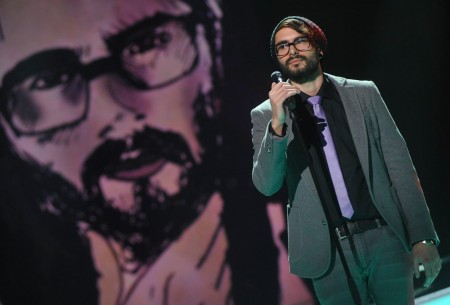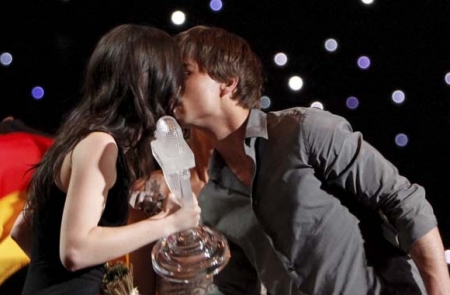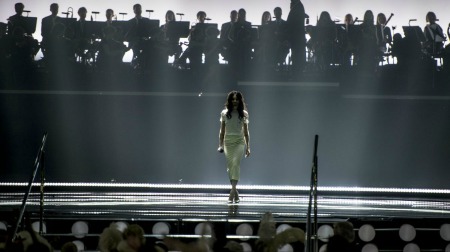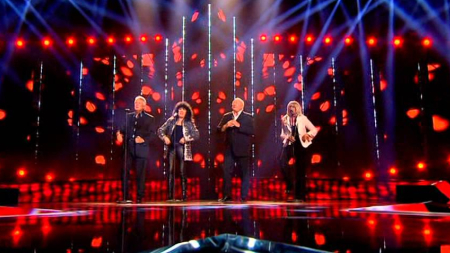To a fan of the Song Contest, Eurovision is life, and in life imitation is the sincerest form of flattery. Whether it’s a little girl wanting to put on her mother’s makeup, Samsung taking inspiration from Apple, or a Rolling Stones cover band getting ready to rock the house, it’s only natural to see the success of what’s come before and try to harness that positivity… in the hopes that it will somehow rub off on you.
At Eurovision, we’ve come to see this all the time. The parallels between past and present could simply be that people support songs that sound familiar to them, whether it’s a Eurovision song of the past (did Tom Dice beget Paradise Oskar, who beget ByeAlex?) or simply the current musical zeitgeist (Avicii’s ‘Wake Me Up’ was a massive global hit, and a trio of folksy, country-infused entries made it to Eurovision the next year).

Can we remember the vocal capacity from ByeAlex?
Whether it was opportunity or coincidence, these songs still made it to the Contest. I am in no way suggesting that delegations go out and specifically select songs that emulate past winners, trying to duplicate their success. Nor am I throwing around the dreaded ‘P-word’ that many fans like to wave around like giant inflatable hammers.
(The P-word is ‘plagiarism’, not ‘Pertti Kurikan Nimipäivat’, for the record).
But once songs reach the international stage, do voters around the continent respond favorably to entries that harken back to the Contest’s recent past, or are they just seen as unoriginal hangers-on, trying to leech off of last year’s podium-placers? And what happens in the years that immediately follow? Let’s take a look at Eurovision’s history over the past decade or so, and see what patterns we can uncover.
Caught In A Hip-Shaking Rut
Between 2002 and 2005, there was a definite pattern to the most successful entries at Eurovision. With the victories of ‘I Wanna‘, ‘Everyway That I Can‘, ‘Wild Dances‘, and ‘My Number One‘, (and, by extension, ‘7th Wonder‘, ‘Runaway‘, ‘Ne ver’, ne boisia‘, ‘Shake It‘, ‘For Real‘, and ‘Let Me Try‘), Eurovision’s musical tastes tended towards upbeat, often ethnically-kissed, generally female-led numbers that lent themselves to fabulous staging and choreography.
Eurovision had found itself in a pattern that was difficult to break; casual fans watching the show were beginning to equate the Contest with this specific style of music. To get out of this potential stylistic rut, it would take an entry so dramatically (some would even say traumatically) different from the recent average that it would grab voters by the scruff of the neck and drag them out of the comfortable little nook that they had made for themselves.
That’s Mister Lordi To You
Before ‘Hard Rock Hallelujah‘, no rock entry had ever made it to the top of the leader board. Technically speaking, the structure of the song isn’t dramatically different from many of the beloved schlager anthems or successful entries of the past; it was the attitude and presentation that was revolutionary. The following year, other participating nations took notice. In 2006, Lordi brought the only rock entry to the Contest. In 2007, when acts met in Helsinki, the entries from Israel, Cyprus, Iceland, Moldova, Croatia, the Czech Republic, Andorra, Estonia, Belarus, Sweden, and home team Finland all had some form of rock (or, at least, pop-rock) influence.
However, even though over a quarter of the songs submitted to Eurovision 2007 were rock-oriented, the success minted by Lordi did not cascade over to acts the next year. Seven of the eleven entries listed above did not qualify for the Grand Final, and none made it to the Top Five. As many of us remember, the winner was a Serbian-language ballad, with an uptempo comedy act taking the silver (not to mention wearing it) and a straightforward pop act taking third.
By 2008, only Turkey, Finland, San Marino, and (arguably) Azerbaijan brought rock to Eurovision, and it seemed that the pendulum was swinging back to pop.

Alexander Rybak with Lena.
In 2009, Alexander Rybak mopped the floor with his competition, with ‘Fairytale‘ gaining points from every single nation that could vote for it, a total of 387 points. His mix of pop and folk, served up with a generous scoop of smirk and swagger, gained support from voters from Iceland to Israel. The following year, Rybak’s influence could be seen in many nations, particularly in the folk-inspired local sounds from Russia, Slovakia, Finland, Latvia, Serbia, Poland, Greece, Armenia, Slovenia, and Ireland.
But, of course, the top three in 2010 were almost devoid of regional influence, with German pop taking the trophy, followed by Turkish rock and a playful Romanian duet. The following year, only a handful of songs leaned towards the ethnic themes that were so present in Norway the year before, with Portugal, Macedonia, Belarus, and half of the Greek entry embracing their national roots (and Norway embracing the roots of their Kenyan-born singer rather than the sounds of Oslo or Bergen).
The Order Of The ‘Phoenix’
Let’s fast-forward a bit. After Conchita Wurst’s victory in Copenhagen, many viewers didn’t know what to expect from the songs of the Eurovision Song Contest in 2015. Could we expect an influx of gender-bending entries inspired by Conchita’s unforgettable look and backstory? Many fans worried about Eurovision turning into the camp pyrotechnic-powered playground that Eurovision-naysayers have always claimed it to be.
While the message of ‘Rise Like a Phoenix‘ was strong, would 2015 take its cues from style or substance?

Last year’s winner Conchita Wurst opens the first full dress-rehearsal of the first semi final.
Photo: Eurovision.tv
As songs began to roll in for the contest in Vienna, and the roster began to fill, trends were certainly noticed. Following an all-ballad podium in 2014, here was an influx of slow entries (particularly female-led ones) outnumbering the dance-pop that had been so prevalent in years past.
Digging deeper, rather than focusing on Conchita’s beard, a large number of entries seemed to take their influence on her message of confidence, self-empowerment, and individuality, both on-stage and off. From Malta and Georgia’s fraternal twin ‘Warriors’, Switzerland’s ‘Time to Shine‘, Belgium’s ‘Rhythm Inside‘, Serbia’s ‘Beauty Never Lies‘, Iceland’s ‘Unbroken‘, Armenia’s “Face the Shadow“, to the eventual winner ‘Heroes‘, songs about finding faith in oneself dominated this year. Out of 2015’s top four songs, two of them (Sweden and Belgium) shared thematic elements with last year’s winner, although they differed greatly from their predecessor in terms of musical structure and presentation.
Furthermore, it appears that the 2014 success of the Common Linnets heralded a rise in the number of duets this year, from four in Copenhagen to eight in Vienna. Looking specifically at the duets from Estonia and Norway, these two melancholy songs about the potential end of love not only took structural cues from The Common Linnets, but thematic ones, as well, and it worked generally well for them; ‘Goodbye to Yesterday’ came in 7th this year, with ‘A Monster Like Me’ hot on their heels at 8th. Furthermore, Slovenia’s entry (which could technically be considered a duet), while significantly more upbeat in style than the aforementioned entries, is also about a fractured, strained relationship; “Here for You” gave the country its second-highest placement in a decade.
Interestingly, there doesn’t seem to be much of a correlation between the rate of similarly-themed entries chosen and their method of selection. While “Heroes“, “Beauty Never Lies“, “Time to Shine” and Georgia’s “Warrior” were picked via national finals with a generally equal weight between public vote and jury, Malta’s “Warrior” was selected via a National Final with a heavy weight on Jury votes and “Rhythm Inside” and “Face the Shadow” were purely internal choices. Considering the proportion of National Final-selected entries to internal picks (approximately 2 to 1), this pattern doesn’t seem out of line.
After looking at the patterns from these past few years of Contest participants, It appears that while songs that mimic the previous year’s winner stylistically generally fail to duplicate their predecessors’ successes, those that reach for thematic parallels might have a better shot. If Måns were dressed in drag and performed ‘Heroes‘ as ‘Månuela‘, Contest fans and voting jurors would likely see it as a copy of Conchita’s winning entry from last year, and would likely not support it as highly as they did this year.
Looking ahead…
If 2016’s songs take their musical and thematic cues from what worked in 2015, we might expect to see a few common threads between next year’s entries.

DMGP 2013: Eurovision trend-setters The Brotherhood Of Man
Following a ballad-heavy year in Vienna capped off by a more upbeat winner, I’d wager that we’ll see more energy from the next crop of songs. Entries embracing the themes of self-actualization and confidence may continue to pop up on our rosters. I’m also going to go out on a bit of a limb and wager that with the success of avant-garde and artistic songs and presentations from Belgium and Latvia, we may see more nations embrace the experimental side of their music scenes.
Of course, whether or not songs that follow these leads are successful in Stockholm remains to be seen, but if songwriters and delegations lean away from trying to mimic past winners and simply take more subtle cues from victories past, a song can potentially stand on the shoulders of giants without appearing completely derivative.










Great read. Trends like those outlined are, I feel, so important for the unpredictability of the contest, making it not only difficult for us the fans to decipher the good from the bad, but also for the general public, whom tend to vote subjectively rather than comparatively. Yearly Trends are exactly why it can take months for us to decide on a winner before being emphatically proven wrong at the end of the Saturday Night in May!.
The 2012 contest as I can remember, had probably the best mix of uptempo and slow we’ve seen to date. Funnily enough I’d argue the successful balladry from 12′ (Serbia, Azerbaijan Estonia to name a few) partially fed through from the success of Azerbaijan, Italy and Ukraine’s slightly bland attempts in 11′. I can imagine the team behind “Kuula” kicking themselves by not writing/entering it a year earlier. Eurovision and Hindsight certainly make a good match, don’t they?
I’d argue that “Heroes” was different from the other self-empowerment anthems because it was about “we” not “I”. While “Heroes” started with Måns singing about himself, the song soon shifted to we/our. It’s not one person singing “I am awesome!” it’s “We are awesome!” “Rhythm Inside” also had a lot of “we” amid the “I”.
For a singer to successfully do the “I am awesome” message, there has to be a strong audience connection. Conchita had oodles of this, but it was a lot harder to forge that same emotional connection with Melanie Rene, Amber, et al. Especially hard when it became, “Oh, another shouty lady with a self-empowerment message. Good for her. Next.”
Also – if “Heroes” inspires more uptempo songs, then that can only be a good thing. I don’t require 26 floor-filler anthems, but just a better mix than this year.
I believe your prediction that ‘nations embrace the experimental side of their music scene’ is most definitely the theme for 2018. Portugal and Azerbaijan captured the sentiment this year, and this terrific article needs reposted next May as a ‘told you so!’ Compelling read. Thanks.
The lesson from the 2017’s Portugal win is simple:You don’t need to be original but you need to be perceived as authentic and sincere and than you can reach far more audience than you have ever thought.
I’m not so sure that we will see ‘nations embrace the experimental side of their music scenes’, but we will see countries going the Portugal way but forgetting the sincerity, the authenticity or both and failing and not understanding why.
This is a very thought-provoking article and it is timely to have it re-posted two years after it was written. I’m no musical expert, but would nevertheless like to share my own rather random observations of trends in the 2016 and 2017 contests (once my cat gets off the keyboard!).
Firstly, who would have thought that non-commercial songs such as 1944 and Amar Pelos Dois stood a chance of winning the contest? Up to and including 2015, they were the sort of song with artistic merit that could, at best, come, a respectable 4th.
Secondly, 2017 saw the return of the fun/novelty song with a vengeance. In recent years entering this genre of song was almost a guarantee of non-qualification (unless you had 6 Russian grannies on hand to deliver it). The 2017 fun/novelty songs were admittedly generally well done, but I fear that this will embolden more countries to enter similar efforts next year which in quality will be more akin to Woki Mit Deim Popo than Mama Mama.
Thirdly, 2017 may mark the point of decline in the number of big booming old fashioned ballads. It is interesting that of the big pop ballads the ones the juries favoured were the two most modern sounding – Australia and Bulgaria. Bulgaria went out of their way to give their staging a modern feel.
Fourth, Belgium’s experience of 2017 showed that a good quality modern radio-friendly pop song without too many bells and whistles can do well at Eurovision. If only they had fielded a more experienced singer!
Fifth, the success of Portugal, Hungary, France and Belarus will probably encourage more countries to send (primarily) native language songs next year.
Finally, Eurovision stages of late have become a lot less cluttered. There are fewer props, backing singers and dancers spread (Balkan style) around the stage, and an almost total reliance on giant LED screens and floor lighting to provide the visual effects. Having just one performer on a massive stage not only risks that performer getting ‘lost’ against the giant LED backdrop, it also leads to a lot of ‘samey’ performances. The UK’s staging this year was ingenious because the staging prop (unlike Azerbaijan’s which was a bit of a throwback to 10 years ago) not only made the staging more intimate for television viewers, it also served to amplify the impact of the LED lighting. Well done UK. Fat lot of good it did you!
Shai, the biggest lesson I took from this year’s winner is that in the contest momentum is everything.
Eurojock – Yes and no.. In recent years you had songs that had momentum from an early stage and kept it till they won(2012,2013,2015) but you had also songs that got momentum at the last moment(rehearsals)on which they built up their win(2014,2016, 2017).